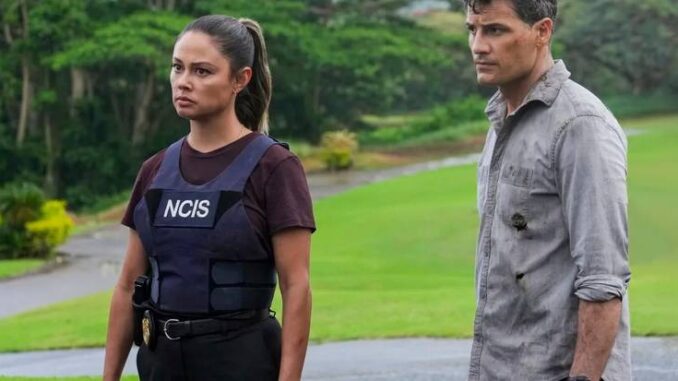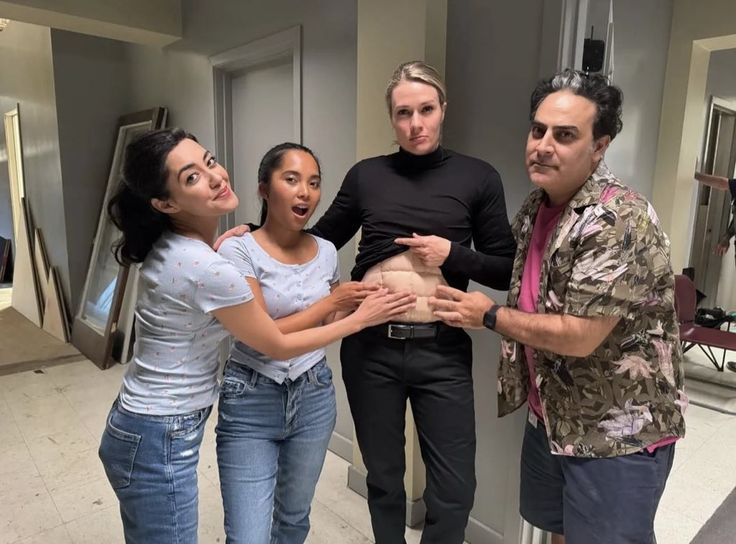
One aspect that really stands out on NCIS: Hawai’i is everyone’s near equal standing on the team. On the flagship series, it very much felt like Gibbs (Mark Harmon) and his team, but those members were never able to stand out as much. NCIS: Los Angeles has a different vibe, but doesn’t stray too much. However, on Hawai’i, it very much feels like Jane works with her team. She is undeniably the leader, that’s for sure, but it doesn’t feel like the series has to constantly remind us of this.
It is intrinsic in the show’s formula and how cases are written, but they are all on equal footing when it comes to solving the cases at-hand. Sure, the series begins with the other members of the team poking fun at newcomer Kai’s expense, but this doesn’t last very long at all, and he immediately feels like a vital member of the team. Overall, the dynamic as a team works better than it does on most procedurals, which is very interesting as the series has only just started their second season on CBS. Things fell into place rather quickly, which could be attributed to this being the third spinoff in the franchise, but seems more likely due to thoughtful writing and great chemistry between the cast.
This also makes Jane stand out in the universe, too, and tees her up to be arguably the best leader we’ve seen thus far. (Yes, even better than Gibbs.) Jane already is a fan-favorite, to no surprise, and this is partially due to the subtle power underneath Jane’s empathy and decision-making that surely comes from Lachey’s layered performance. It’s also quite a breath of fresh air to see a woman in charge, particularly a woman of color who has proven herself tenfold at every step of her career to end up in this position. As the first Asian-American lead in the NCIS franchise, it’s beautiful to watch how much thought and care is put into Jane, both in her career and her personal life, on a weekly basis. The difference in how Jane handles her team versus the other leaders of the NCIS shows only helps Jane to shine and stand on her own.
Why Equality on NCIS: Hawai’i Matters
In a world where many TV shows still favor a lead-heavy narrative, NCIS: Hawai‘i takes a refreshing detour. Sure, Jane Tennant (played by Vanessa Lachey) is the Special Agent in Charge, but what truly makes this team shine is the sense of equality woven into every episode. It’s not just about rank — it’s about respect, collaboration, and shared purpose. Each team member brings something invaluable to the table, and NCIS: Hawai‘i makes sure we never forget it. Let’s dive into why every member of the NCIS: Hawai‘i team is equal — not just on paper, but in spirit, execution, and screen presence.
The Ensemble Cast: More Than Supporting Roles
Everyone Has a Voice
This isn’t a one-woman show. Every character, from Jesse Boone to Lucy Tara, is given meaningful dialogue, emotional range, and character development.
The Power of Balanced Screen Time
Unlike some procedural dramas, NCIS: Hawai‘i masterfully balances its screen time. Each character is allowed to grow, make mistakes, and shine.
Jane Tennant: Leadership Without Ego
A Leader Who Lifts Others
Jane Tennant isn’t the kind of boss who hogs the spotlight. She listens. She mentors. And she steps back when needed — which is the hallmark of a true leader.
Balancing Power and Partnership
While she holds the highest rank, her respect for her team breaks down the usual top-down hierarchy.
Jesse Boone: The Steady Anchor
Experience That Commands Respect
Jesse brings wisdom and calm to the team. His past as a detective gives him a grounded perspective.
A Quiet Leader
He doesn’t need to shout or lead from the front. His authority comes from experience, empathy, and sheer consistency.
Lucy Tara: The Firecracker with Precision
A Force in the Field
Lucy is fearless — whether chasing down suspects or challenging authority. Her small frame packs big confidence.
Heart and Humor
She brings levity to heavy cases, proving that being fierce and fun aren’t mutually exclusive.
Kai Holman: A Deep Soul with a Sharp Edge
From the Islands, For the Islands
Kai represents the local heartbeat of Hawai‘i. His character adds cultural richness and personal stakes to the show.
Fighting Personal Demons
He’s not perfect — and that’s what makes him powerful. His flaws are real, relatable, and raw.
Ernie Malik: The Tech Wizard with Emotional Depth
Not Your Average Nerd
Ernie isn’t just the guy behind the keyboard. He brings emotion, intuition, and moral compass to the team’s high-tech approach.
Comic Relief That’s Clever
He’s the quirky genius every procedural show needs — but with a twist: he’s emotionally intelligent and self-aware.
Whistler: From Friction to Family
Complex Character Arc
FBI Agent Kate Whistler had a rocky start with the team — and with Lucy. But her evolution into a trusted ally is one of the show’s most rewarding arcs.
More Than a Love Interest
Her identity isn’t confined to her relationship. She’s brilliant, bold, and essential to the team’s success.
Team Dynamics: Chemistry That’s Organic
No Forced Drama
This isn’t a team built on artificial tension. Their conflicts are real but respectful. Their friendships? Authentic.
Trust and Teamwork
Whether storming a compound or decoding surveillance footage, they operate with complete trust in each other.
Diversity Done Right
A True Reflection of Hawai‘i
The cast reflects the rich cultural tapestry of the islands, without falling into tokenism or stereotypes.
Everyone Gets a Backstory
No one is background noise. Each character’s past matters and shapes who they are on the job.
Hawai‘i as More Than a Backdrop
The Island Is a Character, Too
The show treats Hawai‘i with reverence, infusing it into every story. The team’s connection to the land and community runs deep.
Local Values = Team Values
Respect, ohana (family), and kuleana (responsibility) aren’t just buzzwords — they guide the team’s behavior.
Equal Importance, Different Strengths
It’s Not About Who’s Best
Each team member has a superpower — tactical, emotional, technical, or investigative. The magic lies in how they complement each other.
Different Paths, Same Goal
Whether ex-cop, hacker, or islander, they all converge to uphold justice — together.
The Writing Room’s Intentional Equality
Writers Who Care About Characters
The writing behind NCIS: Hawai‘i clearly values character depth and growth across the board, not just for leads.
Story Arcs That Serve Everyone
From PTSD to family reunions to career crossroads, each character gets plotlines that matter.

Representation Matters — and It’s Working
Empowering the Audience
When every character is treated as important, viewers feel seen — no matter who they relate to.
Breaking Procedural Tropes
No more sidelining the “tech guy” or overplaying the “boss lady.” Everyone matters, and it’s a refreshing change.
Equality Is the Real Superpower
More Than a Theme — It’s the Core
Equality isn’t just a theme; it’s the ethos of NCIS: Hawai‘i. It’s why fans connect deeply with the show.
Conclusion: A Team That Feels Like Family
In a franchise known for its military precision and crime-solving prowess, NCIS: Hawai‘i stands out for its humanity. Equality isn’t just about job titles — it’s about the energy, respect, and value each character brings. Whether it’s Ernie behind a monitor or Kai charging into danger, each team member is essential. That’s what makes the show not only watchable but rewatchable.
In a world where some voices are still fighting to be heard, NCIS: Hawai‘i says loud and clear: every voice matters. Every member counts.